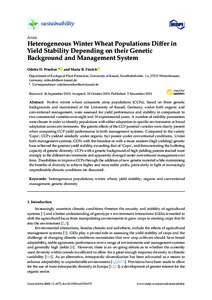Aufsatz

Heterogeneous Winter Wheat Populations Differ in Yield Stability Depending on their Genetic Background and Management System
Abstract
Twelve winter wheat composite cross populations (CCPs), based on three genetic backgrounds and maintained at the University of Kassel, Germany, under both organic and conventional management, were assessed for yield performance and stability in comparison to two commercial varieties over eight and 10 experimental years. A number of stability parameters were chosen in order to identify populations with either adaptation to specific environments or broad adaptation across environments. The genetic effects of the CCP parental varieties were clearly present when comparing CCP yield performance in both management systems. Compared to the variety ‘Capo’, CCPs yielded similarly under organic, but poorer under conventional conditions. Under both management systems, CCPs with the broadest or with a more modern (high yielding) genetic base achieved the greatest yield stability, exceeding that of ‘Capo’, and demonstrating the buffering capacity of genetic diversity. CCPs with a genetic background of high yielding parents reacted most strongly to the different environments and apparently diverged under conventional management over time. Possibilities to improve CCPs through the addition of new genetic material while maintaining the benefits of diversity to achieve higher and more stable yields, particularly in light of increasingly unpredictable climatic conditions are discussed.
Citation
In: Sustainability Volume 11 / Issue 21 (2019-11-05) , S. 6172 ; ISSN 2071-1050Sponsorship
Gefördert durch den Publikationsfonds der Universität KasselCitation
@article{doi:10.17170/kobra-20191105741,
author={Weedon, Odette Denise and Finckh, Maria Renate},
title={Heterogeneous Winter Wheat Populations Differ in Yield Stability Depending on their Genetic Background and Management System},
journal={Sustainability},
year={2019}
}
0500 Oax 0501 Text $btxt$2rdacontent 0502 Computermedien $bc$2rdacarrier 1100 2019$n2019 1500 1/eng 2050 ##0##http://hdl.handle.net/123456789/11333 3000 Weedon, Odette Denise 3010 Finckh, Maria Renate 4000 Heterogeneous Winter Wheat Populations Differ in Yield Stability Depending on their Genetic Background and Management System / Weedon, Odette Denise 4030 4060 Online-Ressource 4085 ##0##=u http://nbn-resolving.de/http://hdl.handle.net/123456789/11333=x R 4204 \$dAufsatz 4170 7136 ##0##http://hdl.handle.net/123456789/11333
<resource xsi:schemaLocation="http://datacite.org/schema/kernel-2.2 http://schema.datacite.org/meta/kernel-2.2/metadata.xsd"> 2019-11-05T12:54:34Z 2019-11-05T12:54:34Z 2019-11-05 doi:10.17170/kobra-20191105741 http://hdl.handle.net/123456789/11333 Gefördert durch den Publikationsfonds der Universität Kassel eng Urheberrechtlich geschützt https://rightsstatements.org/page/InC/1.0/ heterogeneous populations winter wheat yield stability organic and conventional management genetic diversity 630 Heterogeneous Winter Wheat Populations Differ in Yield Stability Depending on their Genetic Background and Management System Aufsatz Twelve winter wheat composite cross populations (CCPs), based on three genetic backgrounds and maintained at the University of Kassel, Germany, under both organic and conventional management, were assessed for yield performance and stability in comparison to two commercial varieties over eight and 10 experimental years. A number of stability parameters were chosen in order to identify populations with either adaptation to specific environments or broad adaptation across environments. The genetic effects of the CCP parental varieties were clearly present when comparing CCP yield performance in both management systems. Compared to the variety ‘Capo’, CCPs yielded similarly under organic, but poorer under conventional conditions. Under both management systems, CCPs with the broadest or with a more modern (high yielding) genetic base achieved the greatest yield stability, exceeding that of ‘Capo’, and demonstrating the buffering capacity of genetic diversity. CCPs with a genetic background of high yielding parents reacted most strongly to the different environments and apparently diverged under conventional management over time. Possibilities to improve CCPs through the addition of new genetic material while maintaining the benefits of diversity to achieve higher and more stable yields, particularly in light of increasingly unpredictable climatic conditions are discussed. open access Weedon, Odette Denise Finckh, Maria Renate doi:10.3390/su11216172 publishedVersion ISSN 2071-1050 Issue 21 Sustainability 6172 Volume 11 </resource>
The following license files are associated with this item:
Urheberrechtlich geschützt

